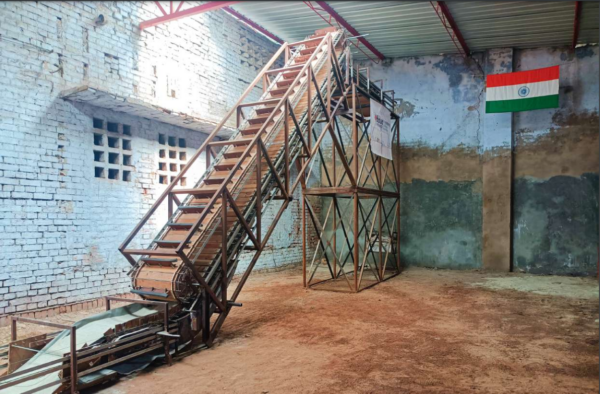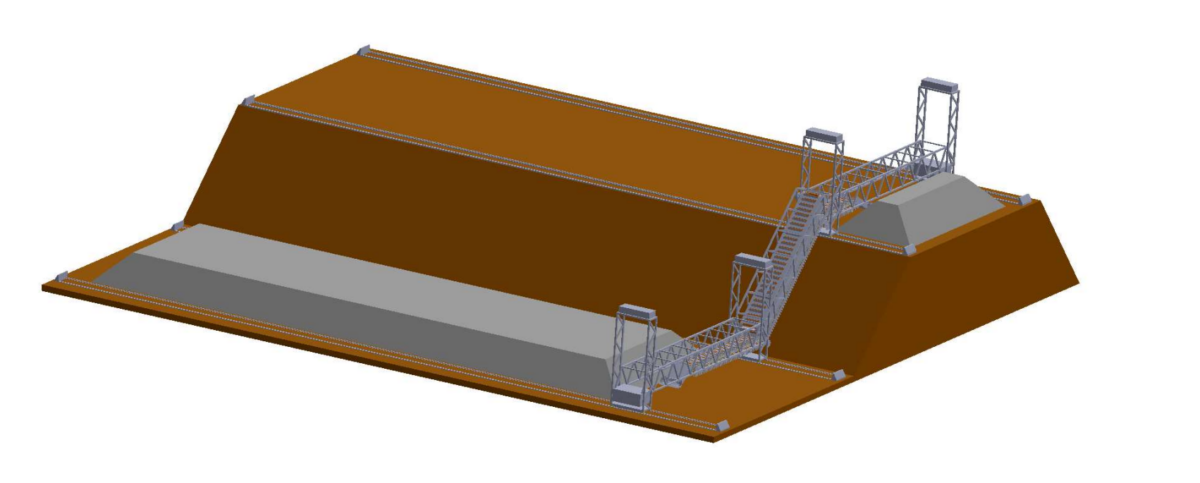Baud Resources, an IIT Kanpur incubated deep-tech startup, has developed a novel approach to gravity-based energy storage that operates on gravitational potential energy without the need for water, dams or hills, unlike the pumped hydro storage.
The mechanism can be implemented in any location (plains, desert or sub-zero climate). It uses locally available materials like sand and industrial waste such as coal-ash or construction waste as payload and relies on artificial inclinations of about 20-40 meters head height to lift sand from the lower station to the upper station and thereby store energy as potential energy. The energy is released when sand is lowered as and when needed.
Dishant Mishra, CEO at Baud Resources, tells pv magazine, “Our proprietary gravity-based storage design [using sand] allows for efficient energy storage and discharge. The mechanism is ideal for long-duration storage and offers cost-effective electricity and high round trip efficiency.”
The startup’s upcoming commercial plant, to be announced this year, will have a 100 MWh capacity and will offer a levelized cost of storage of around INR 2.5 ($0.030)/kWh.
The system is based on a circular economy principle where it uses locally available sand (sourced from the site itself or nearby) and/or industrial waste like coal bottom ash from thermal power plants as payload. The height differential of 20-40 metres is achieved by excavation and reclamation at the site. Continuous mass flow ensures uniform load distribution, mitigating concentrated loading issues seen in block-based gravity storage designs.

Image: Baud Resources
The USP of the technology is its light and movable load transfer engineering which works between the two stations. It does require any permanent steel support structure to hang the payload. This gives Baud’s design an advantage to deliver massive size plants at much lower cost than other gravity candidates. Further, compared to pumped hydro storage, this gravity storage design allows co-location with existing solar and wind plants. It can be delivered at places with scarce water sources or sub-zero climates, where pumped hydro storage may not be a feasible or efficient option.
“With a goal of 500 GW renewable capacity by 2030, the demand for storage is set to rise. The energy storage market in India is projected to reach 350 GWh by 2030. Despite efforts in pumped hydro storage and battery energy storage, a 150 GWh deficit is expected by 2030. We aim to fill this gap with our gravity energy storage system, projecting 20-40 GWh capacity by 2030. We target early adopters with small-scale plants, subsequently scaling to 5-10 GWh projects for higher profitability. Our turnkey energy storage solutions target Indian renewable operators of large scale, with plans for expansion into the EU, US, and MENA markets,” said Mishra.
Mishra said their gravity platform consumes less land than current on-ground solar installations on a per MW basis. “Co-location with solar further adds a different dimension, as gravity application can directly admit DC power for charging from the solar panels while returning AC to the power grid using dual drive motor generators, thus eliminating inverter and its losses. This translates to a higher round trip efficiency and lower capex for integrated renewable projects,” he added.
Baud Resources successfully completed its field demo project at IIT Kanpur in November 2023. Following this achievement, it secured funding from Skoda Auto to support its ongoing and upcoming demo projects. “Looking ahead, we are poised to announce our inaugural commercial plant by the end of this calendar, with completion expected in 2025. Additionally, we are actively engaging with two prominent customers, to further strengthen our market presence,” said Mishra.
This content is protected by copyright and may not be reused. If you want to cooperate with us and would like to reuse some of our content, please contact: editors@pv-magazine.com.









1 comment
By submitting this form you agree to pv magazine using your data for the purposes of publishing your comment.
Your personal data will only be disclosed or otherwise transmitted to third parties for the purposes of spam filtering or if this is necessary for technical maintenance of the website. Any other transfer to third parties will not take place unless this is justified on the basis of applicable data protection regulations or if pv magazine is legally obliged to do so.
You may revoke this consent at any time with effect for the future, in which case your personal data will be deleted immediately. Otherwise, your data will be deleted if pv magazine has processed your request or the purpose of data storage is fulfilled.
Further information on data privacy can be found in our Data Protection Policy.